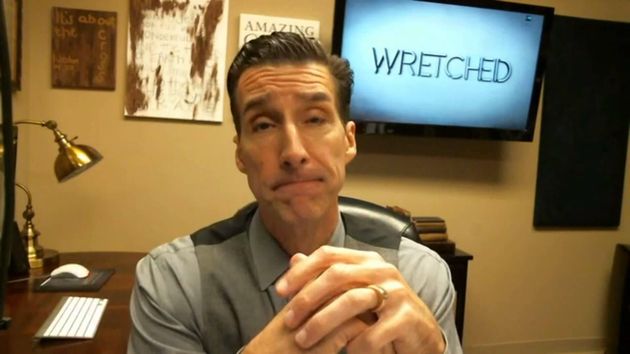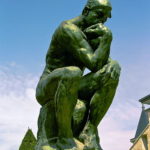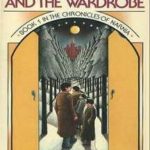The Wretched Controversy
Recently Stephen responded to a posted video clip on Facebook, a promotion piece by Todd Friel for his Wretched radio/TV series, The gist of the episode which I watched is that “wizard stories,” by which he means fantasy, go against Scripture and have no place in the life of a Christian.
The sad thing here is that a number of his Wretched followers left comments agreeing with his position, saying that his views were right. While a number of speculative writers chimed in to give an opposing view, how many of Friel’s followers read those when they had already endorsed the original episode? In other words, one of the reason I object to what this TV and radio host had to say is that he only presented one side—his opinion and his understanding of what the Bible says.
Besides leaving a comment, I also invited Mr. Friel here to Spec Faith for what I termed a print debate. I want people who follow him to know that there are believers who hold fast to the teaching of Scripture who do not agree with the position shared in that Wretched episode. So far I haven’t heard back from him, but I have not given up hope.
I don’t want to wait, though. The longer this Wretched position sits there with only a brief flurry of opposition, the more deadly it becomes. What may have started out as an interesting concept to consider can quickly become a hardened conviction.
The reason is simple: at the heart of what Mr. Friel says is the Bible. In fact Scripture does say exactly what Wretched claims. Here’s the pertinent passage:
you shall not learn to imitate the detestable things of those nations. There shall not be found among you anyone who makes his son or his daughter pass through the fire, one who uses divination, one who practices witchcraft, or one who interprets omens, or a sorcerer, or one who casts a spell, or a medium, or a spiritist, or one who calls up the dead. For whoever does these things is detestable to the LORD (Deut. 18:9b-12a)
From that passage, it’s easy to generalize by saying, “No magic.”
All well and good if magic was the issue here. But the context of the passage is Moses’s warnings to the people of Israel against adopting the idolatrous behavior of the nations they were about to encounter. So killing children and trying to know the future and talking with the dead and all these practices listed in Moses’s command have to do with tapping into a power that does not come from God. It either involves worshiping a false god or trying to use power obtained from a spirit claiming to have power like God.
Mr. Friel never addressed this aspect of the Deuteronomy passage. So in other words, a person could conclude from his show that magic is the real problem when in fact idol worship is the real problem.
Idol worship, of course, doesn’t start or stop with magic. So talking to people about avoiding magic completely misses the mark when it comes to what Scripture actually is saying.
What Mr. Friel says about fantasy reminds me of what the Pharisees said in Jesus’s day about keeping the Sabbath. They particularly wanted Jesus to stop healing people on the Sabbath (which he persisted in doing throughout His ministry). In fact, the Ten Commandments expressly said to keep the Sabbath as holy, and the prophets confronted Israel over and over about breaking the Sabbath.
So weren’t the Pharisees right? No. For one major reason: breaking the traditions that had grown up around the “keep the Sabbath” command, were not the same as breaking the command itself. Jesus also indicated there was some hypocrisy involved in their insistence in keeping the Sabbath they way they prescribed it. They would certainly care for a needy animal on the Sabbath, but they were opposed to Jesus caring for a needy human?
Both these matters apply, I believe. Some Christians like Mr. Friel have raised up traditions—an artificial understanding of magic that includes all things pretend such as flying broomsticks and magic wands, pointy witch hats and wizards that can teleport from one place to another, talking pictures and moving staircases, talking animals and flying dragons. These creative fantasy elements have nothing to do with real power or methods of tapping into a false god’s power. In other words, they become straw men which distract us from the true battle against idolatry.
 The converse is true. When C. S. Lewis told his Narnia stories, he showed in no murky manner what the gospel is all about. He was “healing on the Sabbath,” if you will. People who had not opened a Bible knew in their heart that there had to be a real person like Aslan and a real place like Narnia. To declare the Deeper Magic that Aslan displayed to somehow be off limits and to be avoided is nothing more than restricting the way we can share the truth about Jesus Christ.
The converse is true. When C. S. Lewis told his Narnia stories, he showed in no murky manner what the gospel is all about. He was “healing on the Sabbath,” if you will. People who had not opened a Bible knew in their heart that there had to be a real person like Aslan and a real place like Narnia. To declare the Deeper Magic that Aslan displayed to somehow be off limits and to be avoided is nothing more than restricting the way we can share the truth about Jesus Christ.
Because, make no mistake, the power of fantasy is in the good versus evil trope—with good winning. Only when someone like Phillip Pullman flips the script and writes evil as good, does fantasy present a problem. But that happened in the Bible too. Moses turned his staff into a snake and the magicians in Egypt did the same thing. So, a little discernment here is helpful. Which is the power of God and which the power of a false god?
Of course when Moses’s snake/staff ate the others, the point was no longer muddled. We might have to work a little harder, but the answer is clearly not to outlaw staffs.












































I enjoy reading fantasy and have been wondering frequently about the place of magic in fantastic stories. Whatever your stance is on the issue, it can never mean that Christians can’t read wizard stories at all on account of magic being sinful. After all that would mean we could never write / read stories about terrorist, rapists, murderers because their actions are sinful, too. There is always a place for wizard stories, provided the wizard is the antagonist. On that part at least all Christians should be able to agree.
The issue becomes a little bit more difficult when the protagonist is using magic and I don’t think that it can always be reduced to whether a particular story connects their particular magic system with idol worship. I think the troublesome thing about magic is the (potential) pursuit of power that you shouldn’t have.
I also don’t think that all of the things in the list of Deut. 18 mentioned above are connected with direct idol worship / demons, particularly fortune-telling and interpreting of omens. There are certainly ways of fortune telling directly involving demons, at the same time there are ways of fortune-telling that don’t involve demons directly (tarot cards, palm reading, reading intestines of animals etc.), where it’s just a matter of learning how to interpret the things used.
I live in Indonesia where there are hundreds of (mostly animistic) people groups of whom many derive meaning from every-day occurrences like sickness and death or various animal calls. Sickness and death is always due to somebody’s sin or else due to curses. People find out the reason behind it and adjust their lives accordingly. When you hear a certain animal call a certain way it has meaning and it influences people’s actions. We might consider it harmless superstition, but I think it falls into the category of interpreting omens.
Fortune-telling is different from prophecy to the extent that prophecy originates from God at a time of His choosing, whereas fortune-telling is the attempt of knowing the future at a time of my choosing and adjusting my life accordingly.
The danger of fortune-telling and interpreting of omens is not idol worship, but rather the pursuit of walking by sight rather than by faith.
When we consider the place of magic in fantastic stories, I believe we need to go further than just whether a particular kind of magic system resembles real life magic. We need to discern whether any kind of magic system real or imagined becomes a vehicle to overcome powerlessness and uncertainty in our lives in order to become emancipated from any sort of outside influences including God’s. It seems to me that God prefers that a certain amount of powerlessness and uncertainty be present in our lives, so that we grow in our dependence upon him.
Some excellent points, Sasch. I agree with all of this. I love your statement that powerlessness and uncertainty helps us grow in our dependency upon God. Amen and amen.
I guess in the US culture, “idols” is much broader. Power can be an idol, money can be an idol, position can be an idol.
I think Satan is behind all idols. He is a liar and the father of lies, so he wants us to believe that we can stand on our own and do for ourselves, that we don’t need God. It’s that position that needs to be exposed as wrong. So if someone is searching animal intestines for clues about the future, that, as I understand it, is just another turning from God, turning to a false belief that stands in His place. Same with any other “superstition” or “sophisticated” idea that does not give God His place.
BTW, I also loved this line: “There is always a place for wizard stories, provided the wizard is the antagonist. On that part at least all Christians should be able to agree.” Amen again.
Becky
Yeah, this guy is taking a passage that discourages the ACTION of sorcery/idol worship/ etc. and taking it to mean that it is sinful to DISCUSS its existence in stories/read about non existent people using magic. I would say there is a point where we shouldn’t read about the sorcery stuff, depending on how it is depicted in the story and what the story’s message is. But fiction rarely actually encourages sorcery, just depicts characters that believe in and use it.
And, well, fantasy can be nearly anything, it doesn’t even have to have magic in it. So even if we wanted to say that it is wrong to have any magic in any story, that wouldn’t mean that all fantasy is wrong.
Rebecca, I agree with the tenor of what you are saying, and have no objection to the type of magic that we see, for example, in Harry Potter, which is the main culprit in Friel’s eyes, at least from a Wretched show that I can recall several years ago. Taking Harry Potter as the example, the main argument I would make is that the nature of the magical abilities of the witch and wizard is overtly revealed in the distinction between the wizard/witch and the muggle. One group has the inherent (by birth and naturally, God-given) magical gifts, and the rest of us do not. It is as simple as that. Each one in either group is in a state of common grace, carrying out his efforts to fulfill the cultural mandate (consciously or unconsciously) with the gifts he has as one made in the image of God. In either state, the image is suppressed and the working out of his gifts (natural/magical) most often are not consciously done for the glory of God, nor are they ever free from the corruption that is within the heart. Hence, you have Hitlers and Churchills (or, Voldemorts and Dumbledores) in both.
Escapism is the attempt to set aside negative thoughts or feelings by pursuing a diversion from reality. This often takes the form of fantasy, where one imagines or dreams of a different world. Escapism can also be expressed in material ways. This might include the use of food, sex, drugs, or sports. The term escapism is frequently used in a negative sense, suggesting that people who seek diversions are irresponsibly avoiding “real life.” Yet any activity intended to take one’s mind off of some aspect of daily life is a form of escapism. As such, not all escapism is bad. Of course, too much—or the wrong kind—can be extremely harmful.
In a broad sense, virtually all forms of entertainment could be considered types of escapism. People naturally tire of focusing directly on the heavy burdens of life, such as a job, health concerns, chores, taxes, family obligations, to-do lists, and so forth. Recreation, in general, helps a person temporarily “escape” from the mental and spiritual weight of those issues. When someone reads a book, watches a movie, participates in sports, listens to favorite music, daydreams, or indulges in a hobby, he or she is taking a break from less-pleasant aspects of “reality.”
For the most part, however, the term escapism specifically refers to activities that directly remove our minds and thoughts from the real world. Fantasies, including books or movies about other worlds, are just one expression of this. In this sense, true escapism is a way of breaking out of the “real” world. It means seeking something different or something better or something more according to our tastes. In particular, an intent to avoid is the key feature of classic escapism; it’s a deliberate attempt to shun reality at least for a while.
The Bible describes things like work and effort in positive terms (Colossians 3:23; Proverbs 12:11; 18:9). At the same time, the concept of “rest” is fundamental to God’s relationship to mankind (Genesis 2:1–3; Exodus 20:11; Mark 2:27). There is nothing unbiblical about “taking a break,” whether physically or mentally. Some of what could be called “escapism” fits into this category: an acceptable way to rest from the everyday pressures of life. C. S. Lewis frequently defended the value of fantasy literature and imagination for this very reason. Diversions are not wrong simply because they involve imagining a different world or changes to this one.
While the Bible encourages appropriate recreation and refreshment, it also warns against excess. Wasting our time, failing to meet our obligations, damaging our bodies, or toying with addiction are all signs that we’ve crossed a line from reasonable rest into excessive escapism. God encourages us to recharge (Matthew 11:28) and to look forward to a new and better world (Hebrews 11:14–16). Still, He does not want us to foolishly ignore what is actual and real (1 Corinthians 8:9; 2 Peter 3:17).
Todd Friel is a negative man. He is not comfortable in his own skin. Mr. Friel demeanor says so much about him. No doubt, he is a Fundamentalist. I think he received a degree from Northwestern in broad casting. Correct me if I am wrong but he really doesn’t have an education in the Bible. What little education that he has received is from the pulpit. In my opinion, this makes him unqualified. Fundamentalist are not usually educated very well. If they do have an education they usually go to a Christian College, usually one recommended by their own denomination. The problem with a Christian College recommended by your own denomination is that it leads to narrowness of mind and pride. Honorary Doctorates are given out not earned. Mr. Friel is real proud of himself. He basically finds a problem and then tries to nilhlate the problem with the scriptures. The approach is usually short sighted. Fundamentalist type people are bad about lifting the scripture out of context; therefore giving new meaning the scripture under servalience. In all of his little talks he is always the hero. The man with the truth! He stands ready to rescue the masses. I watched that video. He is probably not going to debate you about it. Deep down Fundamentalist are cowards. They know what their crowd expects and they deliver. I often watch them on YouTube to get a good laugh. One preacher, I constantly watch preaches King James only. I get real tickled over the dumb stuff that Fundamentalist say. In closing, Mr. Friel is a negative man with a negative message. Can you just imagine going to a church every Sunday and listening to him? He really has issues between the ears. Fundamentalist people are hard to help because they have been brainwashed. He doesn’t understand “make believe,” what real and not real. By the way, I loved Harry Potter.
Be Encouraged, Howard Johnson
Howard Johnson, Its weird you call Friel a fundamentalist when he has talked at length about fundamentalists errors. He is not a fundamentalist and you should repent for calling a brother Christian a coward over a tertiary issue.